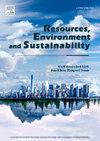ESGOnt:基于本体的框架,用于加强环境、社会和治理(ESG)评估并与可持续发展目标(SDG)保持一致
IF 7.8
Q1 ENVIRONMENTAL SCIENCES
引用次数: 0
摘要
本研究提出了ESGOnt,这是一个基于本体的框架,将环境、社会和治理(ESG)管理与可持续发展目标(sdg)相结合。ESGOnt通过为ESG和可持续发展目标的整合提供统一的结构,解决了可持续资源治理体系和跨部门互操作性方面的关键挑战。该框架是通过一种系统的方法开发的,该方法结合了文献综述、ESG和SDG关系的标准化、适应性成熟度模型的开发以及使用Methontology和NeOn等既定方法实现的本体。ESGOnt能够整合各种ESG分类和ESG报告标准,包括GRI和ESRS,并协助公司进行ESG绩效评估。通过真实用例进行的实证验证表明,其能够(1)直接评估具有特定可持续发展目标的ESG评估,例如可持续发展目标13(气候行动)和可持续发展目标12(负责任的消费和生产),(2)通过不同的指标评估组织ESG进展,(3)促进小型和大型企业的标准化和可互操作报告。(4)自动验证组织是否符合欧盟非财务报告指令法规。研究结果表明,ESGOnt通过集成和可审计的可持续发展报告解决了数据不一致和透明度问题。该框架的本体驱动方法支持可扩展的和与政策相关的工具,用于跟踪环境和社会影响,而其成熟度模型侧重于资源效率的战略性改进。未来的研究将分析和扩展ESGOnt的功能,以满足特定行业的需求,如生物经济控制系统,并探索先进的人工智能驱动的检测方法,用于实时评估ESG-SDG。本文章由计算机程序翻译,如有差异,请以英文原文为准。

ESGOnt: An ontology-based framework for Enhancing Environmental, Social, and Governance (ESG) assessments and aligning with Sustainable Development Goals (SDG)
This study proposes ESGOnt, an ontology-based framework that aligns Environmental, Social, and Governance (ESG) management with Sustainable Development Goals (SDGs). ESGOnt addresses key challenges in sustainable resource governance systems and cross-sector interoperability by providing a unified structure for ESG and SDG integration. The framework was developed through a systematic methodology that combines a literature review, standardization of ESG and SDG relationships, development of an adaptable maturity model, and ontology implementation using established methods such as Methontology and NeOn. ESGOnt enables the integration of diverse ESG taxonomies and ESG reporting standards, including GRI and ESRS, and assists companies in their ESG performance evaluation. Empirical validation through real-world use cases demonstrates its capability to (1) direct assessment of ESG assessments with specific SDG targets, such as SDG13 (Climate Action) and SDG 12 (Responsible Consumption and Production), (2) assess organizational ESG progress through different metrics, (3) facilitation of standardized and interoperable reporting for small and large enterprises, and (4) automatically validate organization compliance with EU Non-Financial Reporting Directive regulations. The findings show that ESGOnt resolves data inconsistency and transparency issues by enabling integrated and auditable sustainability reporting. The ontology-driven approach of the framework enables scalable and policy-relevant tools for tracking environmental and social impacts, while its maturity model focuses on strategic improvements in resource efficiency. Future studies will analyze and extend ESGOnt’s functionality for sector-specific capabilities, such as bioeconomy control systems, and explore advanced AI-driven inspection methods for real-time ESG-SDG assessment.
求助全文
通过发布文献求助,成功后即可免费获取论文全文。
去求助
来源期刊

Resources Environment and Sustainability
Environmental Science-Environmental Science (miscellaneous)
CiteScore
15.10
自引率
0.00%
发文量
41
审稿时长
33 days
 求助内容:
求助内容: 应助结果提醒方式:
应助结果提醒方式:


